How can diversity benefit communities?
By Bruntwood Works

Our societies and communities are becoming increasingly more diverse. Through gender, race, religion, sexual orientation, age, culture, socioeconomic background, and so much more. We see this happening everywhere: in social groups, schools, businesses, neighbourhoods, and cities and countries as a whole.
Providing that we are accepting of the way in which other people live, this diversity can only be a good thing. The more we understand one another, the more we can learn and the more we can develop as societies.
Being part of a diverse community allows us to understand and experience more about the world around us, helping us to embrace new ways of thinking and living.
For places to truly thrive through its differences, the community must support diversity by listening to the needs of all its people, seeing diversity as an opportunity. Diversity goes hand in hand with the need for inclusion: making sure that places work for everyone and people feel included and integration, no matter their background. It is much more than observable differences. We recognise the importance of welcoming diversity of thought, ideas and experiences, and the valuable contribution that makes to our workplaces, communities and cities.
This can be achieved through the building of trust between groups, a culture of openness and tolerance among the city population and better neighbourhood relationships (Directorate of Internal Oversight of the Council of Europe/Evaluation of the Intercultural Cities (ICC) Programme, 2014). Cities should encourage the sharing of ideas, empowering individuals to be themselves and offer their unique insight.
Our world is constantly changing at a rapid pace, and with that comes more diversity. Only places, organisations and groups in which all of these diversities are respected and valued can truly thrive. Places that embrace diversity create tighter communities which work well together. Encouraging diversity helps to build inclusive communities as everyone feels as though they play a part in the decisions that affect their lives.